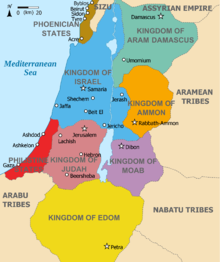Aholibamah, is an eight-time referenced matriarch in the biblical record.

Esau is the elder son of Isaac in the Hebrew Bible. He is mentioned in the Book of Genesis and by the prophets Obadiah and Malachi. The Christian New Testament alludes to him in the Epistle to the Romans and in the Epistle to the Hebrews.

The Horites, were a people mentioned in the Torah inhabiting areas around Mount Seir in Canaan.
The Hivites were one group of descendants of Canaan, son of Ham, according to the Table of Nations in Genesis 10 (10:17). A variety of proposals have been made, but beyond the references in the Bible to Hivites in the land of Canaan, no consensus has been reached about their precise historical identity.
Eliphaz was the first-born son of Esau and his wife Adah. He had six sons, of whom Omar was the firstborn, and the others were Teman, Zepho, Gatam, Kenaz and finally Amalek, who was born to his concubine Timna. The people of Amalek were the ancestral enemy of the Israelite people.
Basemath, in the Hebrew Bible, is one of the wives of Esau.
Mahalath was, according to the Bible, the third wife of Esau, daughter of Ishmael and sister of Nebaioth. Esau took Mahalath from the house of Ishmael to be his wife, after seeing that Canaanite wives displeased his father, Isaac.
The Hittites, also spelled Hethites, were a group of people mentioned in the Hebrew Bible. Under the names בני-חת and חתי they are described several times as living in or near Canaan between the time of Abraham and the time of Ezra after the return of the Jews from the Babylonian exile. Their ancestor was Heth.
Nebaioth or Nebajoth is mentioned at least five times in the Hebrew Bible, according to which he was the firstborn son of Ishmael, and the name appears as the name of one of the wilderness tribes mentioned in the Book of Genesis 25:13, and in the Book of Isaiah 60:7.
In the Hebrew Bible, Zephon was a son of Eliphaz. According to the book of Genesis, his brothers were Omar, Teman, Gatam, Kenaz and Amalek. He is mentioned in Genesis 36:11.
Teman, was the name of an Edomite clan and of its eponym, according to the Bible, and an ancient biblical town of Arabia Petraea. The term is also traditionally used in Biblical Hebrew as the synonym of the direction South and was applied to being used as the Hebrew name of Yemen due to its location in the Southern end of the Arabian Peninsula, thus making Yemenite Jews being called "Temanim" in Hebrew.
Omar was the name of a man mentioned in the Bible, the ancestor of a Semitic Edomite and Canaanite clan, the son of Eliphaz. Omar's brothers were Teiman (Yemmen), Zepho, Ga'atam, Kenaz and Amalek.
Lotan, the eldest son of Seir the Horite, was the first-listed of seven chief of the Horites in the land of Seir in Genesis 36. He had two sons, Hori and Hemam. Esau's son Eliphaz married Lotan's sister Timna, who gave birth to Amalek.

Rebecca appears in the Hebrew Bible as the wife of Isaac and the mother of Jacob and Esau. According to biblical tradition, Rebecca's father was Bethuel the Aramean from Paddan Aram, also called Aram-Naharaim. Rebecca's brother was Laban the Aramean, and she was the granddaughter of Milcah and Nahor, the brother of Abraham. Rebecca and Isaac were one of the four couples that some believe are buried in the Cave of the Patriarchs, the other three being Adam and Eve, Abraham and Sarah, and Jacob and Leah.
Korah or Kórach, son of Esau, is an individual who is described in the Book of Genesis in the Hebrew Bible.

1 Chronicles 1 is the first chapter of the Books of Chronicles in the Hebrew Bible or the First Book of Chronicles in the Old Testament of the Christian Bible. The book is compiled from older sources by an unknown person or group, designated by modern scholars as "the Chronicler", and had the final shape established in late fifth or fourth century BCE. The content of this chapter is the genealogy list from Adam to Israel (=Jacob) in the following structure: Adam to Noah ; Noah's descendants from his three sons Shem, Ham, and Japheth: the Japhethites, Hamites, Semites ; the sons of Abraham ; the sons of Isaac. This chapter belongs to the section focusing on the list of genealogies from Adam to the lists of the people returning from exile in Babylon.
Zibeon is one or perhaps two biblical figures mentioned in the Book of Genesis and the First Book of Chronicles.






